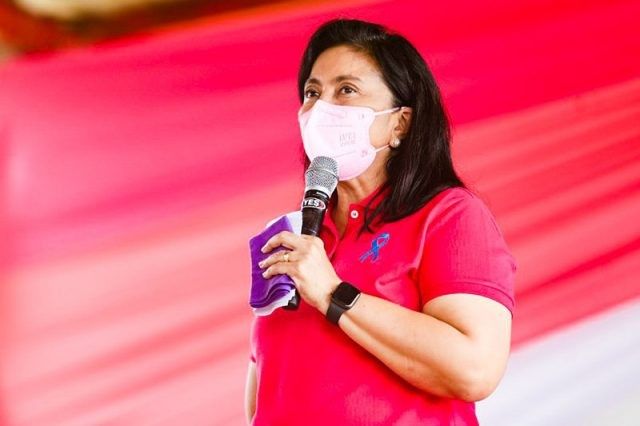Robredo open to amending Constitution for sake of investments

MANILA, Philippines — Presidential aspirant and Vice President Leni Robredo said Friday she is open to amending economic provisions in the Constitution to allow for more foreign investments into the country.
“I am very much open to exploring any proposed constitutional amendment that would unlock current roadblocks that are thrown our way as long as we ensure that the process is open, transparent and people are given the opportunity to participate,” Robredo said in a forum on economic reforms.
The 1987 Constitution restricts foreign investments in natural resources, public utilities, educational institutions, media and advertising to varying degrees by either requiring that ownership of businesses in these industries be at least 60% Filipino or wholly owned by Filipinos.
Introducing changes to these provisions have long been discussed in Congress, with the latest push coming from the House of Representatives led by Speaker Lord Allan Velasco which attempted to put forward amendments that would allow Congress to tweak these constitutional restrictions.
Velasco and his allies in the House reasoned that foreign investments would need to pour into the country as its economy was badly hit by the COVID-19 pandemic, which is why there is supposedly a need to introduce changes to the economic provisions in the Constitution.
The proposal, however, did not prosper as senators were averse to introducing changes to the Constitution, according to Senate President Tito Sotto.
Public Service Act
When Velasco renewed the push to amend the Constitution, Robredo said in her weekly radio show that lawmakers should instead focus on legislation that could help the country respond better to the pandemic and recover from its impact.
“We passed the anti-terror law and ABS-CBN was closed down amid the pandemic, and now we're pushing for charter change? Have we not learned to focus our energies and attention to things that would not burden our people?” she said then in Filipino.
Now, Robredo says that “urgent concerns” regarding protectionist provisions on foreign capital can be addressed without having to amend the Constitution by tweaking the Public Service Act or Commonwealth Act No. 146.
The amendments to the law, which the House passed in March 2020 and the Senate in December 2021, seeks to narrow down the definition of what a public utility is, which the Constitution requires to be at least 60% owned by Filipinos.
But the proposal has yet to be sent to President Rodrigo Duterte for his signature as the House and the Senate have yet to thresh out the differences between their amendments to the Public Service Act.
The Senate version, for one, wants to introduce more safeguards which Robredo backs.
“It is my hope that the strong safeguards are put in place during the bicam, during the deliberations so that our national interests and the welfare of the Filipino people are protected,” she said.
So far, the Philippines managed to relax some of its strictest foreign investment restrictions after Duterte signed last month Republic Act 11595 which amends the Retail Trade Liberalization Act of 2000. The new law reduced the minimum paid-up capital requirement for foreign retailer to P25 million pesos ($490,000) from $2.5 million, making it easier for these companies to open up their business in the Philippines.
- Latest
- Trending






























